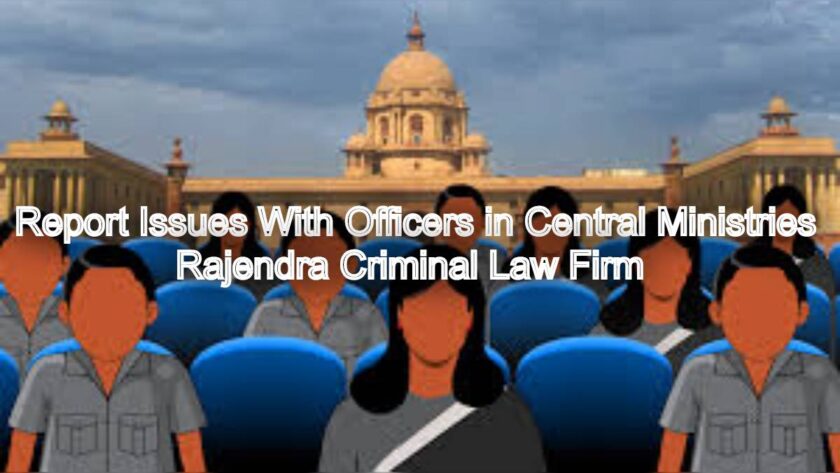How to Report Issues With Officers: Dealing with misconduct or irregularities involving officers in Central Ministries can be a daunting task. At Rajendra Criminal Law Firm, we understand the complexities of these situations. Indeed, navigating the bureaucratic maze requires a clear understanding of the established procedures and legal avenues. Therefore, we provide guidance on how to effectively report such issues and ensure accountability.
How to Report Issues With Officers in Central Ministries: Rajendra Criminal Law Firm
Understanding the Scope of Misconduct
First, it is crucial to define the scope of misconduct. Specifically, this can range from corruption and bribery to abuse of power and dereliction of duty. For example, an officer might engage in financial misappropriation, accept illegal gratifications, or show undue favoritism. Moreover, delays in service delivery, harassment, and violation of official protocols also fall under the purview of misconduct.
Furthermore, the impact of such misconduct extends beyond individual cases. For instance, it can erode public trust, hinder government efficiency, and undermine the rule of law. Consequently, reporting such issues is not only a matter of personal grievance but also a civic responsibility.
Identifying the Appropriate Reporting Channels
Subsequently, identifying the correct reporting channels is essential. Initially, you should determine the nature of the complaint and the specific ministry or department involved. Then, you can choose from various avenues, including internal vigilance units, the Central Vigilance Commission (CVC), and the Central Bureau of Investigation (CBI).
Moreover, for internal matters, most ministries have vigilance officers or units responsible for handling complaints. For instance, these units conduct preliminary inquiries and recommend appropriate action. Additionally, the CVC, as the apex vigilance institution, oversees all vigilance activities in Central Government organizations.
Furthermore, in cases involving serious criminal offenses like corruption or bribery, the CBI is the primary investigating agency. Therefore, understanding the jurisdiction and mandate of each agency is crucial for effective reporting.
Documenting Evidence and Filing Complaints
Next, meticulous documentation of evidence is paramount. For example, gather all relevant documents, including letters, emails, receipts, and photographs. Similarly, maintain a detailed record of conversations and interactions. Indeed, credible evidence strengthens your complaint and enhances its chances of success.
Additionally, prepare a clear and concise written complaint. For instance, state the facts of the case, identify the officers involved, and specify the nature of the misconduct. Moreover, include copies of supporting documents and provide contact information for further inquiries.
Furthermore, submit the complaint through the appropriate channel. For example, you can file a complaint with the CVC online or send a written complaint by post. Similarly, you can lodge a First Information Report (FIR) with the CBI in cases of criminal offenses.
Navigating the Investigation Process
Following the filing of the complaint, the relevant agency initiates an investigation. Subsequently, they may conduct preliminary inquiries, gather evidence, and record statements. Indeed, the investigation process can be lengthy and complex, requiring patience and persistence.
Moreover, cooperate fully with the investigating agency. For instance, provide any additional information or documents they request. Similarly, attend any interviews or hearings as required. In essence, your cooperation can significantly aid the investigation.
Furthermore, maintain regular communication with the investigating agency. For example, inquire about the progress of the investigation and seek updates on the status of your complaint. Additionally, keep copies of all correspondence and records.
Legal Recourse and Protection of Rights
Additionally, understanding your legal rights is crucial. For example, you have the right to protection from retaliation and harassment. Similarly, you have the right to seek legal recourse if your complaint is not addressed adequately.
Moreover, consider seeking legal counsel. For instance, a lawyer can advise you on your rights, assist in drafting complaints, and represent you in legal proceedings. Indeed, legal representation can ensure that your interests are protected throughout the process.
Furthermore, you can approach the courts or tribunals if the investigation is delayed or if you are dissatisfied with the outcome. For example, you can file a writ petition in the High Court or Supreme Court, seeking appropriate relief.
Ensuring Accountability and Transparency
Ultimately, reporting misconduct is essential for ensuring accountability and transparency in Central Ministries. Therefore, it is crucial to follow the established procedures and utilize the available legal mechanisms. In essence, your proactive involvement can contribute to a more just and efficient system.
Moreover, the government has implemented various measures to promote transparency and accountability. For instance, the Right to Information (RTI) Act empowers citizens to access information from public authorities. Similarly, the Whistle Blowers Protection Act safeguards individuals who report corruption.
Furthermore, public awareness and participation are vital for combating corruption and misconduct. Therefore, we encourage citizens to exercise their rights and report any irregularities they encounter.
Reporting Issues With Officers in Central Ministries: FAQs
A: You can report various forms of misconduct, including corruption, bribery, abuse of power, dereliction of duty, financial misappropriation, harassment, and violation of official protocols.
A: You can report to internal vigilance units within the ministry, the Central Vigilance Commission (CVC) for general oversight, or the Central Bureau of Investigation (CBI) for serious criminal offenses like corruption and bribery.
A: You should provide detailed documentation, including letters, emails, receipts, photographs, and records of conversations. A clear written complaint outlining the facts and identifying the officers involved is also essential.
A: The relevant agency will conduct inquiries, gather evidence, and record statements. You may be asked to provide additional information or attend interviews. Cooperation and regular communication with the investigating agency are crucial.
A: You can seek legal counsel, approach courts or tribunals, and file writ petitions in the High Court or Supreme Court. The Right to Information (RTI) Act and the Whistle Blowers Protection Act also provide avenues for legal protection and transparency.
The Rajendra Criminal Law Firm Advantage
In conclusion, reporting issues with officers in Central Ministries requires a thorough understanding of the legal and procedural framework. At Rajendra Criminal Law Firm, we offer expert guidance and legal support to navigate these complex situations. Ultimately, our goal is to ensure that your rights are protected and that justice is served. Therefore, we provide comprehensive legal services, from drafting complaints to representing clients in court. In essence, our commitment to integrity and justice ensures that your voice is heard.
Read More
- Steps to File a Complaint Against Central Government Police Forces (CISF, CRPF, BSF)
- How to Complain About Customs Officers at Airports and Ports
- How to Report Corruption in Central Public Works Department (CPWD)
- How to Register a Grievance Against Income Tax Department Officers
- Complaint Procedures for Officers in the Indian Postal Department
- Centralized Public Grievance Redress and Monitoring System (CPGRAMS):





